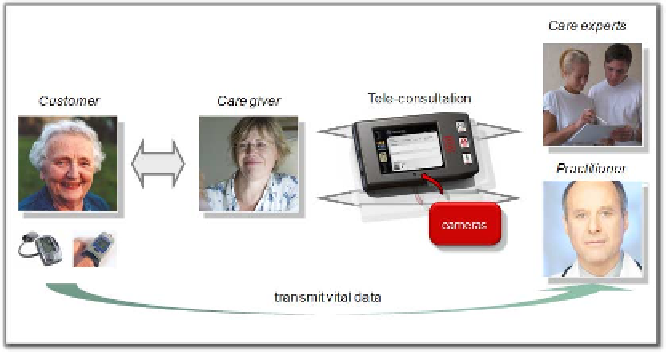Information Technology Reference
In-Depth Information
Figure 3.
Tele-consultation for home care.
The primary question to ask when defining best practice when a variety of services
is on the market is: “What answer do we have to meet the needs of care and
inequality?” Respect needs to be given to the balance between the means of local
authorities and the State on the one hand and that of the means of the clients who are
able to purchase on the private market on the other. Furthermore, inequalities between
individuals do not only exist in the economic field; they can also exist in the means of
their offspring or by the environment of the neighborhood. It also needs to be
remembered that the organization of professional help is by no means automatic. The
client's choice, the opinions and arguments of relatives must also be taken into account
and should be based on the actual situation of the client. However, the need for
professional help is also the solution chosen in a crisis, when informal care is perhaps
no longer possible.
Another aspect of best practice is seen in organizing professional help for older
people and in the quality of the availability of information that identifies the tasks
offered by service providers. Information on care services must be not only available,
but also fully descriptive and understandable.
In the face of parameters including increased needs, cost control, different options
for residential care, interaction of different levels of service, the organization of
professional care-at-home systems is a complex task. Those involved in putting into
place institutional care by professionals must include the viewpoint of clients, which is
after all taking into account the satisfaction of the older people themselves.
Supporting integrated care with multi-disciplinary care teams.
In a domiciliary
home-care organization care givers have the special task of carrying out their function
independently in contrast to care givers who work in a residential or nursing institution.
Reliable solutions for ensuring the exchange of information are a vital part of care-
service organization. The role of the care-service organizer is therefore of crucial
importance: first and foremost in choosing the most appropriate technological system
to put into place. Among other tasks, it must ensure that the exchange of information
between the care givers of the service, between the care givers and all other external
agencies that are concerned with the user-patient, and through very reliable systems
between the network of carers, helpers, cleaners, and the case manager.

